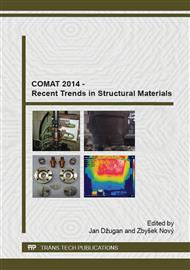p.1
p.9
p.17
p.23
p.31
p.39
p.49
p.55
Small Size Specimens Methods for Evaluation of Mechanical Properties
Abstract:
The evaluation of actual mechanical properties of the in-service structures after some time of operation or determination of local properties for detailed FEM simulation yields the necessity to obtain relevant material data with high accuracy from small volume of the experimental material. Therefore, non-destructive or semi-destructive techniques using small size samples are being developed. The use of small-scale samples also enables the evaluation of material properties in various locations of tested component; for example, the mechanical properties of the individual regions of welds, local properties determination for properties anisotropy assessment and properties determination in cases when small volume of the experimental material is available e.g. residual service life assessment of in service components, bulk nanostructured materials… There are shown results of small size tensile tests (M-TT) and small sized fatigue tests (SFT). In the case of small size specimens testing a machining becomes more pronounced that in the case of standard sized specimens. The current study brings information on the machining influence on the expected results obtained by small size specimens in the case of quasi-static tensile tests and fatigue test.
Info:
Periodical:
Pages:
1-8
DOI:
Citation:
Online since:
October 2015
Authors:
Price:
Сopyright:
© 2015 Trans Tech Publications Ltd. All Rights Reserved
Share:
Citation:


